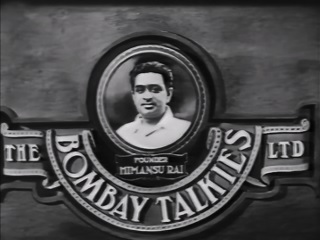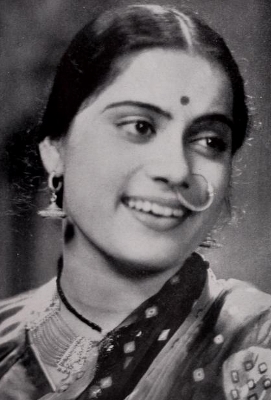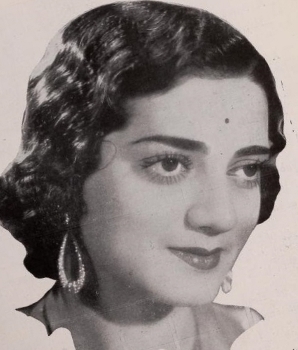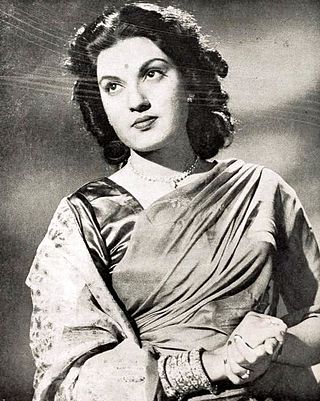
Devika Rani Chaudhuri, usually known as Devika Rani, was an Indian actress who was active in Hindi films during the 1930s and 1940s. She was the first recipient of the Dadasaheb Phalke Award, and was also awarded the Padma Shri. Widely acknowledged as the First Lady of Indian Cinema, Devika Rani had a successful film career that spanned 10 years.

Bombay Talkies was a movie studio founded in 1934. During its period of operation, Bombay Talkies produced 40 movies in Malad, a suburb of the Indian city of Bombay.

Basant (transl. Spring) is a 1942 pre-partition Indian romantic musical film directed by Amiya Chakrabarty, produced by Bombay Talkies and starring Mumtaz Shanti and Madhubala along with Ulhas. It revolves around Uma (Shanti), who is left to dance on stage for money when her husband (Ulhas) abandons her.

Amiya Chakravarty was an Indian film director, screenwriter and producer, who was leading film director in Hindi cinema of the 1940s and 1950s. He is noted for films like Daag (1952), Patita (1953), and Seema (1955) for which he won the 4th Filmfare Award for Best Story. Chakravarty is also credited along with Devika Rani for discovering Dilip Kumar, whom he gave his first break in 1944 film Jwar Bhata .Chakravarty also produced and directed, for Mars & Movies Productions which he had launched after leaving Bombay Talkies, the film Daag in 1952 for which Dilip Kumar won his first ever Filmfare Award for Best Actor.

Manoos, also called Life's for Living, is a 1939 Indian Marathi social melodrama film directed by V. Shantaram. The movie was simultaneously made in Hindi as Aadmi. The film was based on a short story called "The Police Constable". The story was by A. Bhaskarrao, with screenplay and dialogue by Anant Kanekar. The cinematographer was V. Avadhoot and the music was composed by Master Krishna Rao, with lyrics by Kanekar. The cast included Shahu Modak, Shanta Hublikar, Sundara Bai, Ram Marathe, Narmada, Ganpatrao and Raja Paranjpe.

Veer Kunal also called Son Of Ashoka is a 1945 Hindi historical fiction film directed by Kishore Sahu. Besides directing the film Sahu also produced it and wrote the story and screenplay. The cinematographer was Chandu. Produced under the Ramnik Productions banner, it had music by Khan Mastana. The starcast consisted of Kishore Sahu, Shobhna Samarth, Durga Khote, Mubarak and Maya Banerji.

Thokar also called The Kick is a 1939 Indian Hindi-Urdu film directed by A. R. Kardar. Produced by Chandulal Shah for his production banner Ranjit Movietone, it has music by Gyan Dutt. The story writer was M. Sadiq, with cinematography by Gordhanbhi Patel. The cast included Kumar, Ishwarlal, Madhuri, Yakub, Noor Mohammed Charlie, Ram Marathe, Waheedan Bai and Dixit. The story involves a blind villager winning a lottery but he eventually realises that money can not bring happiness.

Milap (transl. the union is a 1937 Indian social drama film directed by A. R. Kardar. Produced under the Moti Mahal Pictures banner, it had music composed by K. C. Dey. Milap was a big success for the actress Rampyari.

Jeevan Prabhat is a 1937 Hindi film social drama, produced by Bombay Talkies and directed by Franz Osten. The music director was Saraswati Devi with lyrics and dialogues by J. S. Casshyap. The screenplay was by Niranjan Pal. The film's "star value" was Devika Rani, with Kishore Sahu making his debut as an actor in the film. The cast included another debutant, Renuka Devi, with Mumtaz Ali, Maya Devi and M. Nazir.
![<i>Izzat</i> (1937 film) 1937 [[British India]] film](https://upload.wikimedia.org/wikipedia/commons/thumb/9/9c/Izzat_%281937%29.jpg/320px-Izzat_%281937%29.jpg)
Izzat (transl. Honour) is a 1937 Hindi film social drama, directed by Franz Osten. The film was produced by Himanshu Rai for Bombay Talkies. The credit roll of Izzat attributes the story to Dr. G. Nundy, adapted for screen by J. Nundy. The screenplay was by Niranjan Pal, who handled the story section of Bombay Talkies. J. S. Casshyap wrote the songs and dialogues and was assisted in dialogue direction by S. I. Hassan. The music was composed by Saraswati Devi, with actor Mumtaz Ali doubling as the choreographer. The film starred Ashok Kumar with Devika Rani in the lead, while the rest of the cast included Mumtaz Ali, Madhurika, Kamtaprasad, Chandraprabha, and P. F. Pithawala.
![<i>Bhabhi</i> (1938 film) 1938 [[British India]] film](https://upload.wikimedia.org/wikipedia/commons/thumb/5/5f/Bhabhi_1938.jpg/320px-Bhabhi_1938.jpg)
Bhabhi (Sister-in-Law) is a 1938 social family drama Hindi film directed by Franz Osten. The film was based on a Bengali novel written by Sharadindu Bandyopadhyay called "Bisher Dhoan". Bandyopadhyay was a famous Bengali novelist and short story writer also known as the creator of the fictional detective Byomkesh Bakshi. The cinematographers were Wirsching and Pareenja. Dialogues and lyrics by J. S. Casshyap. V. H. Desai, the comedian, got his "big break" in Bhabhi when he joined Bombay Talkies. He became popular as the nervous father of the heroine Renuka Devi. S. N. Tripathi started his acting with a small role in the film. The film had the new found Renuka Devi in the lead.
![<i>Vachan</i> (1938 film) 1938 [[British India]] film](https://upload.wikimedia.org/wikipedia/commons/thumb/6/62/Vachan_1938_films.jpg/320px-Vachan_1938_films.jpg)
Vachan is a 1938 costume drama Hindi film directed by Franz Osten. The regular Bombay Talkies writer, Niranjan Pal, walked out of the Bombay Talkies production team after an altercation with Himanshu Rai in 1936. Saradindu Bandyopadhyay, a famous writer known also for creating Byomkesh Bakshi, replaced Pal in the story department, writing for films like Nirmala and Vachan in 1938 and Durga in 1939. The screenplay was by Agha Jani Kashmiri, with dialogues and lyrics by J. S. Kashyap. The music was composed by Saraswati Devi aided by J. S. Kashyap. The film starred Devika Rani and Ashok Kumar, a popular pair from Bombay Talkies who worked in seven films together. Devika Rani remained the bigger star with Kumar's name being "over-shadowed" in the credit rolls, as well as the publicity of the film.

Shanta Apte (1916–1964) was an Indian actress-singer who worked in Marathi and Hindi cinema. Renowned for her roles in films like Duniya Na Mane/Kunku (1937) and Amar Jyoti (1936) under the Prabhat Films banner, she was active in Indian cinema from 1932 to 1958. Apte's impact on Marathi cinema "paralleled" that of Kanan Devi in Bengali cinema. Along with Kanan Devi, Apte is cited as one of the "great singing stars" from before the playback singing era. Apte began her career in films playing the role of a young Radha in the Marathi film Shyamsunder (1932). She joined Prabhat Films acting in her first Hindi language film Amrit Manthan in (1934).

Nartaki (Dancer) is a 1940 film directed by Debaki Bose for New Theatres Ltd, Calcutta. A bilingual made in Hindi and in Bengali, it had story and screenplay written by Bose, with cinematography by Yusuf Mulji. Music was composed by Pankaj Mullick. The cast had actress Leela Desai playing the title role of Nartaki. Najam also called Najam-Ul-Hasain or Najmul Hussain had left Bombay Talkies following his affair and elopement with Devika Rani, had now joined New Theatres Ltd, where he was cast in films like Anath Ashram (1937), Dushman (1939), Kapal Kundala (1939), and Nartaki. The rest of the main cast included Jagdish Sethi, Wasti and Pankaj Mullick in the Hindi version.
Abhagin is a 1938 Hindi film directed by Prafulla Roy for New Theatres Ltd., Calcutta. A bilingual, it was made in Bengali language as Abhigyan. The film was based on a story by Upendranath Ganguly, with dialogue by A. H. Shore. R. C. Boral provided the music composition with lyrics for the Hindi version by Munshi Arzu, and by Ajoy Bhattacharya for the Bengali. The screenplay was by Phani Majumdar for whom it was his first independent film as a scriptwriter. Bimal Roy, who was to make a name for himself as a prominent Bengali and Hindi director, was the cinematographer for the film. The cast included Molina Devi, Prithviraj Kapoor, Vijay Kumar, Nemo and Bikram Kapoor.

Bibbo was a music composer, singer and actress who worked in both Indian and Pakistani films. She acted in Indian cinema from 1931 to 1947 before moving to Pakistan, following Partition of India in 1947. She started her acting career with Ajanta Cinetone Ltd. in 1933, working with directors like M. D. Bhavnani and A. P. Kapoor. She was one of the top leading ladies of the 1930s along with actresses like Devika Rani, Durga Khote, Sulochana, Mehtab, Shanta Apte, Sabita Devi, Leela Desai and Naseem Banu. She was referred to as "one of the most important female stars of the 1930s and 1940s". Her fame had her featured in the lyrics of a popular song from the film Gharib Ke Lal (1939) sung by Mirza Musharraf and Kamla Karnataki, with music by Sagheer Asif and lyrics by Rafi Kashmiri. "Tujhe Bibbo Kahoon Ke Sulochana", where Sulochana referred to another popular actress of the time. This was the first time a song featuring famous actors was used in the lyrics of a film song.

Chaturbhuj Doshi (1894–1969) was a Hindi and Gujarati writer-director of Indian cinema. He was one of the top Gujarati screenplay writers, who helped script stories for the Punatar productions. He is stated to be one of the leading figures who launched the Gujarati film industry with work on notable films like Gunsundari (1948) and Nanand Bhojai (1948). Doshi, was “well known” for his family socials and had become “a celebrity in his own right”. He made a name for himself as a journalist initially and was referred to as the "famous journalist" and publicist by Baburao Patel, editor of Filmindia.

Sabita Devi (1914–1965) was a Hindi film actress in Indian cinema. She is stated to be one of the "prominent" leading ladies of the "pioneering era" of Indian cinema along with Mehtab, Bibbo, Durga Khote, Gohar, Devika Rani and Seeta Devi. A Jewish by birth, she changed her name to find acceptability in Hindi cinema like the other Anglo-Indian and Jewish actresses of her time, Sulochana, Seeta Devi, Madhuri, and Manorama. After initially working with British Dominion Films Ltd., Calcutta, she shifted to Bombay and performed mainly in films produced by Sagar Movietone with her co-star in most films being Motilal. Some of the popular films with Motilal were Dr. Madhurika (1935) and Kulvadhu (1937) directed by Sarvottam Badami. Their first film together was Shaher Ka Jadoo (1934), which was also Motilal's debut film, and then Lagna Bandhan (1936) both directed by Kaliprasad Ghosh. She acted in Silver King (1935) with Motilal. It was an action film directed by C. M. Luhar, which became a "huge success".

Munawar Sultana was an Indian cinema actress, who acted in Hindi films. She is cited as one of the "popular" actresses of the late 1940s to early 1950s period, along with Noor Jehan, Swarnalata and Ragini. Her specialty was playing a selfless woman, enduring the rough treatment meted by her husband and family, but who eventually "brought her erring husband back home".










![<i>Izzat</i> (1937 film) 1937 [[British India]] film](https://upload.wikimedia.org/wikipedia/commons/thumb/9/9c/Izzat_%281937%29.jpg/320px-Izzat_%281937%29.jpg)
![<i>Bhabhi</i> (1938 film) 1938 [[British India]] film](https://upload.wikimedia.org/wikipedia/commons/thumb/5/5f/Bhabhi_1938.jpg/320px-Bhabhi_1938.jpg)
![<i>Vachan</i> (1938 film) 1938 [[British India]] film](https://upload.wikimedia.org/wikipedia/commons/thumb/6/62/Vachan_1938_films.jpg/320px-Vachan_1938_films.jpg)





